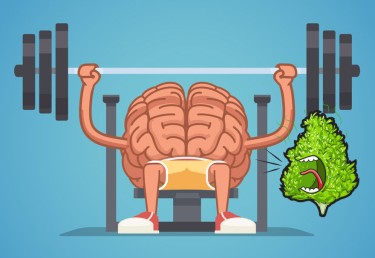
Being an athlete is a tough job.
Aside from making sure you are in top mental and physical shape every day to perform, there are also occupational hazards involved particularly with contact sports. Concussions as well as chronic traumatic encephalopathy (CTE) are common among athletes who play contact sports; the damage it causes to the brain results in serious afflictions such as a gradual reduction in memory as well as other cognitive skills. This is significant for thousands of contact sport players all over the world, especially in Europe and North America.
Right now, there is no treatment for CTE and other brain injuries. Sports doctors offer management plans and athletes have to do their part to try and prevent it in the first place. Using a helmet is the best way to prevent CTE, and maximizing the use of safety gear available.
But new studies are popping up which show that chronic cannabis use can help mitigate the effects of repeated head injuries. The latest of these is promising; the study was subsidized by the Research Funds from the Indiana University Office of Vice President for Research as well as the National Institute of Neurological Disorders and Stroke. The authors sought to analyze how cannabis can assist in the recovery of athletes who suffered from repetitive brain injury as a result of sports. While there are several contact sports, the authors focused on soccer players and compared the neurological effects among cannabis consumers to those who did not consume.
Forty-three soccer players participated in the study. They were divided into groups of weekly consumers and non-consumers based on their consumption patterns. The average age of participants is 20, and their preferred methods of consumption were edibles, smoking, or vaping. The researchers also used a controlling heading model which replicates the intensity of taking 20 headers straight, which enabled them to study oculomotor impairment risks and the neurodegenerative diseases that can occur as a result of these.
Additionally, researchers studied S100B markers in the participants. These are protein markers, and higher concentrations of these are associated with neurodegenerative disease and brain damage. They found that the cannabis consuming group had a reduction in S100B markers compared to those who didn’t partake, signifying a reduction in risk for neurodegenerative disease.
“Our data show that chronic cannabis use may be associated with an enhancement of oculomotor functional resiliency and suppression of the neuroinflammatory response following soccer heading,” concluded the authors. “NPC has benefited from cannabis use in relation to faster recovery from 20 headings, while serum S100B level reflected the cannabis’ anti-inflammatory effects,” they said.
These results are significant for sports leagues as well as soccer players who want to minimize the risks that come with their sport. Long term damage may once have been an occupational hazard, but with promising studies such as these on cannabis, the plant may be the key to preventing neurodegeneration and other chronic brain conditions.
There are legitimate reasons for sports leagues to also get rid of penalties associated with players testing positive for cannabis use because it has shown to be important medicine they need to stay healthy for their chosen careers. The National Basketball Players Association (NBPA) and the National Basketball Association (NBA) already joined other sports leagues this year in cannabis reforms.
Other Studies
There are several other older studies that support these findings. There is also growing evidence that both CBD and THC compounds are beneficial in preventing as well as mitigating the symptoms involved with traumatic brain injury and CTE.
A study from 2014, for example, was conducted by researchers at the UCLA Medical Center on the impact of cannabis use on patients with TBI. The study was retrospective in nature, analyzing data from patients of brain trauma. The researchers analyzed a total of 446 cases of patients who had similar injuries, and they found that of the patients who tested positive for cannabis, 97.6% had a successful surgery. On the other hand, the patients who tested negative for cannabis before surgery had an 88.5% survival rate.
“Our data suggest an important link between the presence of a positive THC screen and improved survival after TBI,” concluded the authors. “This finding has support in previous literature because the neuroprotective effects of cannabinoids have been implicated in a variety of neurodegenerative diseases such as Alzheimer’s disease, Huntington’s disease, and multiple sclerosis… With continued research, more information will be uncovered regarding the therapeutic potential of THC, and further therapeutic interventions may be established.”
Since both CBD and THC, the primary cannabinoids in marijuana, interact with the endocannabinoid system which also controls cognitive function, it makes perfect sense that they also help to safeguard brain neurons in the event traumatic injury occurs.
Currently, the National Institutes of Health (NIH) and the NFL are funding studies that could help them have a better understanding on how cannabis impacts the side effects of concussions. The findings, if promising, have the potential to revolutionize sports medicine in the future so that athletes can enjoy better physical and mental health. After all, it’s about time that ALL professional sports change their stance regarding cannabis. Professional players should have the independence to decide if cannabis is a medication that can help them, and they should have the freedom to medicate with it if they and their doctors see fit, to help them with recovery and overall well-being.
CANNABIS AND BRAIN HEALTH, READ ON…
CANNABIS AND CTE, A NEW GLIMMER OF HOPE?
- SEO Powered Content & PR Distribution. Get Amplified Today.
- PlatoData.Network Vertical Generative Ai. Empower Yourself. Access Here.
- PlatoAiStream. Web3 Intelligence. Knowledge Amplified. Access Here.
- PlatoESG. Automotive / EVs, Carbon, CleanTech, Energy, Environment, Solar, Waste Management. Access Here.
- BlockOffsets. Modernizing Environmental Offset Ownership. Access Here.
- Source: http://cannabis.net/blog/medical/does-regular-cannabis-consumption-lead-to-less-concussions-and-brain-injuries-in-athletes




